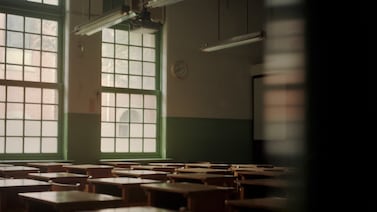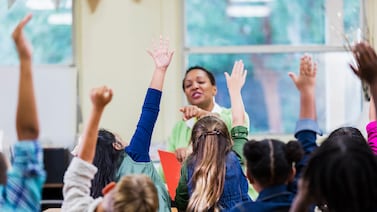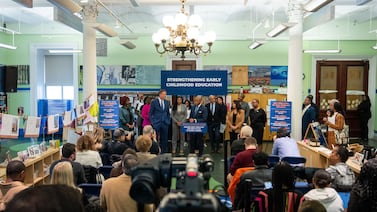Sign up for Chalkbeat Philadelphia’s free newsletter to keep up with the city’s public school system.
On an unseasonably warm day in Philadelphia, Tiye Thompson was investigating a mystery.
Thompson, 46, is one of more than a thousand city residents, mostly women of color, who spend their own time and money supporting Philadelphia’s youngest readers by serving as “reading captains.”
A few days earlier, as part of that work, Thompson and a group of neighborhood matriarchs papered South Philly with fliers for a big party they were throwing to celebrate “Reading Promise Week” and promote early literacy. She booked sponsors, volunteers, free food, and even an inflatable bouncy castle to boost the event.
She could have sworn she put one of her painstakingly laminated signs to promote the event on a sidewalk tree. But now, it’s gone. “What is going on?” Thompson asked. “Who is taking these signs and where did y’all put them?”
Thompson’s tenacity about finding that single sign mirrors her dedication to the reading captains program, a quintessentially Philly invention.
Armed with a crash course of expert training in the science of reading, phonics, and other early literacy techniques, reading captains help prepare parents and guardians to reinforce the lessons kids are learning in the classroom. They fan out into neighborhoods with one goal: Make sure the children on your block have the support they need to read on grade level. Because right now, many of those children cannot.
They are also plugged into a volunteer network that spans the city. They know prekindergarten application deadlines, how to spot students at risk of dropping out, and other aspects of the education ecosystem. And unlike other people involved in education and schools, they can knock on doors to provide children with direct support, like free books and other literacy resources.
“It’s very Philly, and it’s very in your face,” said Simone Partridge, director of communications at Read by 4th, a coalition of groups working to improve early literacy in Philadelphia. “It’s like, I’m going to show you and I’m going to bring you along, whether you like it or not, you are going to love literacy by the end of this five-minute conversation.”
Most Philadelphia district students in grades 3-8 can’t read on grade level according to the latest standardized test data. And over 30% of children in third grade, which is considered a critical year for literacy, are scoring at “below basic” on those exams — the lowest score level.
Adults aren’t doing much better. Recent federal data from the National Center for Education Statistics shows some 22%of Philadelphians aged 16 and older “lack the most basic literacy skills.” That same federal data, collected by advocacy group Achieve Now, shows 52% of Philadelphia’s adults are functionally illiterate.
All that means many Philadelphians may struggle to fill out job applications, apply for local and federal resources, and help their children become strong readers. In short, a lack of reading skills sustains the cycle of poverty, Partridge said.
Partridge works closely with the reading captains to champion their work.
“Reading captains are the heart and engine of Philly’s early literacy movement,” Partridge said. “When I say they make change happen quicker and faster than anybody else, I mean it.”
Black women are ‘mothering the community’ through literacy
The reading captains program launched in September 2017 as an extension of a collaboration between the Read By 4th campaign and Global Citizen, a civic engagement group in the city.
The program is modeled after the city’s block captain program — another initiative powered by volunteers who organize neighborhood clean-ups and beautification efforts.
Reading captains organize block parties, group discussions, read-aloud events at laundromats and cafes, and they connect parents working with young readers to existing resources. They aren’t tasked with giving instruction or tutoring directly to students, but some come to the program with a background in education and can offer that kind of one-on-one support.
And many of the reading captains giving their time and energy to this effort are Black women and women of color, Partridge said.
“There’s a culture of Black women, particularly older Black women, giving back to their community … and extending their time,” she said. “With or without recognition that is happening. Whether you see it or not, whether they are funded, or not,” Black women are “mothering the community,” Partridge added.
For Thompson, the effort is personal and intergenerational.
Her family has been a mainstay on the block since 1941. Thompson’s grandmother (her “nana”) was a community fixture on 18th street and her house — which Thompson now owns and is raising her young daughter in — was a gathering place for neighbors of all ages.
“I refuse to allow the neighborhood to do anything but blossom,” Thompson said, “because I know how hard my grandmother worked … whatever it takes, whatever I have to do, I’m going to make sure it gets done. No excuses.”
Diane Mills, a reading captain who helps run the program in West and Southwest Philly, said every volunteer approaches their job differently because each region and neighborhood has unique needs. But what connects them is their devotion to preparing the city’s children for a successful future.
“We want to see our children thrive by five, so they can read by fourth grade, so the street doesn’t take them and by seventh grade, they drop out,” Mills said. “If we don’t grasp them now, then we’re failing society and failing to help our future leaders to become powerful and take on the mantle that we have left.”
Mills said some of her family members struggled with their reading comprehension, which is part of what made the literacy issue so important for her.
Before the Reading Captain program existed, Mills, like many of her fellow reading captains, worked with several community volunteer and mentoring groups teaching reading, community health skills, HIV/AIDS awareness, and other issues that involve young people.
Then, in 2021, Mills had a health scare that almost took her life. She recovered, but said that experience was like God giving her a second chance.
“I’ve always had a passion for literacy, but after my illness, it was more like ‘this is my mission, to reach parents and their children.’ This is what I really have to do: Bring life to children through reading,” Mills said.
And their energy extends beyond academic concerns. As a reading captain, Mills organized an opera performance for students in a trendy hotel ballroom, complete with passed hors d’oeuvres. She said she wanted to give Philly students the chance to experience opulence and what it feels like to be waited on, something she said many young kids — especially Black kids or kids from low-income backgrounds — don’t get in the city.
For Eden Galan, a reading captain in Northeast Philadelphia, the pandemic spurred her to join the movement. Galan had already been volunteering as a bilingual reading coach in the city and mentoring students in the school district.
But watching her first grade son’s virtual classes, she noticed the wide array of abilities and challenges each student came to class with. In her neighborhood, many students are English language learners and speak Spanish, Arabic, Portuguese, and a host of other languages.
Galan said seeing those challenges made her “want to help and make a change in our city.”
“We’re a class of hard-working people, we have refugees, we have immigrants with different needs,” Galan said. “I love how on my block, you’ll just go a couple of doors down and you see so many different people, you’ll hear so many different languages.”
And that impacts how she approaches her job as a reading captain. Last October, Galan held a festival for kids in the Northeast which featured bilingual read-aloud events, dodgeball games, free food, and free books available in English, Spanish, and Arabic.
She recalled attending another reading captain event where immigrant families were encouraged to share their experiences raising children and attending school in the U.S. Those opportunities for families from all backgrounds to share their struggles and successes around education is central to the role reading captains play in their communities.
“If you create the opportunities for people to come together, they’re going to come together,” Galan said.
‘I think all neighborhoods should have reading captains’
Reading captains don’t work directly with the school district, but their efforts are coinciding with a districtwide plan to overhaul how students learn to read.
Starting next school year, the Philadelphia school district will be rolling out a new English language arts curriculum with a focus on the science of reading, as part of Superintendent Tony Watlington’s strategic plan.
But while district officials focus on the curriculum, test score data, and the demands of supporting teachers and students, Mills said reading captains can take a more personal approach and act as a trusted messenger to instill a love of reading beyond the classroom.
Adara Richardson, whose young daughter is classmates with Thompson’s daughter, called the program “amazing.”
“I think all neighborhoods should have reading captains,” Richardson said. “It gives children a different perspective on life. And it allows them to see that there’s other things to do besides just carelessly and misguidedly roaming the streets.”
Shannon Petty, a mom on the block, said her daughter Elia is “reading very well now because she had so many resources available to her at a young age,” most of those through connections to reading captains.
Elia said she loved the artwork, the books, and the moonbounce at the block party but said she especially loved the cotton candy.
Reading captains are the Philly community
The reading captains understand something fundamental about Philly: History means something.
Gabrielle Saylor, Thompson’s childhood best friend and a former education advocate in the city, said organizing and gaining neighborhood trust in Philly takes time and, sometimes, generations.
“Philadelphia is a legacy place,” Saylor said.
It’s that collective history that the reading captains want to share with new residents.
But Thompson’s block has been slowly gentrifying, and that can mean more challenges to the relationship-building work reading captains do.
A new neighbor who moved into the rowhouse where Thompson’s poster went missing said she threw the sign away. She didn’t like that Thompson had stapled it to a tree and said she thought attaching a poster to it could harm the tree.
Thompson said she was hurt that her preparation for the “amazing block party” was treated with such disrespect.
“I’m giving, and giving, and giving of my time,” Thompson said, “so to get slapped and kicked in the butt because of a poster on a tree, that’s when it gets heavy.”
But Thompson pushed on. She and neighborhood matriarch Betty Beaufort — an unceasing voice in the fight to fund libraries in Philadelphia — put their signs up on a telephone pole instead.
Word got around and the event was a success. Kids from the block filled tote bags with free books and gathered on colorful cushions to have stories read to them. Other volunteers set up tables recruiting for after-school activities including Scrabble competitions.
The neighbor who removed the sign did not attend.
“I’m not doing this for me, I’m doing this for my community,” Thompson said. “It’s okay for [someone] not to participate, because everybody else is going to get a benefit from it. And if I just see one more baby come up to me and say that they finished a chapter of a book, and they’re waiting for the next book well, I’m good. It’s worth it.”
Carly Sitrin is the bureau chief for Chalkbeat Philadelphia. Contact Carly at csitrin@chalkbeat.org.





